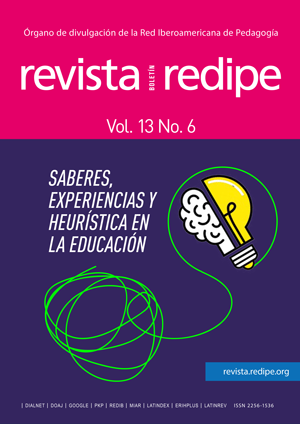Beyond learning
Main Article Content
Keywords
Pedagogy, General Didactics, Learning, Education, Consciousness, Paradigm, Complexity
Abstract
The essay argues on the thesis that basing education on learning is a radical error caused by a myopic consciousness. It works from the Central European epistemological tradition, in which the fields (education, teaching, learning, training, curriculum, etc.) are differentiated from disciplines, and where Pedagogy and General Didactics are the Sciences of Education and teaching par excellence. It is developed from the radical and inclusive approach to education. This perspective is different and complementary to that of the consensual pedagogical paradigms (positivist, interpretative or socio-critical) and has been defined as the fourth paradigm. It assumes a theory of the formation of maxims that is not exempt from utopia, understood as the blood of education. It takes as a reference the concept/phenomenon of full education. Full education includes both the existential dimension of the human being and its essential dimension, normally unnoticed, neglected or ignored by Pedagogy and General Didactics and the supranational organizations that deal with education. Hence the qualifier ‘inclusive’.
References
Anderson, M. C., & Hulbert, J. C. (2021). Active forgetting: Adaptation of memory by prefrontal control. Annual Review of Psychology, 72, 1–361. https://doi.org/10.1146/annurevpsych-072720-094140
Araya-Véliz, C., Arístegui, R., & Fossa, P. (2017). Pasos hacia una enacción relacional. Aporte, ambigüedades y limitaciones del concepto embodied mind en Francisco Varela: un análisis metateórico. Mindfulness & Compassion, 2, 41-46. https://doi. org/10.1016/j.mincom.2016.12.003
Arboleda, J. (2021). Hacia una didáctica comprensivo edificadora. Revista de la Red Iberoamericana de Pedagogía (REDIPE), 10(3), 30-79. https://doi. org/10.36260/rbr.v10i3.1218
Arboleda, J. C. (2020). Educar para la evolución de la vida humana y planetaria. Revista de la Red Iberoamericana de Pedagogía (REDIPE), 9(6), 51-65. https://revista. redipe.org/index.php/1/article/view/998
Ariza, L. M. (2010). Antonio Damasio: el mago del cerebro. El País Digital (10/11/2010). http://elpais.com/diario/2010/11/07/ eps/1289114814_850215.html
Biesta, G. (2006). Beyond learning. Democratic education for a human future. Paradigm Publishers.
Bloom, B. S. (1968). Learning for mastery. Evaluation Comment, 1(2), 1-11. chrome- https://files.eric.ed.gov/fulltext/ ED053419.pdf
Bloom, B. S., Englehart, M. D., Furst, E. J., Hill, W. H., & Krathwohl, D. R. (1956). Taxonomy of educational objectives: The classification of educational goals. Handbook I: Cognitive domain. David McKay.
Bloom, B. S., Krathwohl, D. R., & Masia, B. B. (1964). Taxonomy of Educational Objectives, Handbook II: Affective Domain. David McKay.
Bruer, J. (1995). Escuelas para pensar: una ciencia del aprendizaje en el aula. https://unesdoc.unesco.org/ark:/48223/ pf0000171997
Buda (1997). Dhammapada o las enseñanzas de Buda. FCE.
Calvo Muñoz, J. (2008). Propensión a aprender y procesos de mediación ¿escolar o educativa? Encuentros y desencuentros con la cultura desde una perspectiva crítica. https:// www.integracion-academica.org/ anteriores/12-volumen-2-numero-4- 2014/46-propension-a-aprender-yprocesos-de-mediacion-escolar-oeducativa-encuentros-y-desencuentroscon-la-cultura-desde-una-perspectivacritica
Cebes (1995). Tabla. Disertaciones. Fragmentos. Gredos.
Common Core State Standards Initiative (n.d.). Development Process. https:// www.thecorestandards.org/about-thestandards/development-process/
Damasio, A. (1999). The feeling of what happens: body and emotion in the making of consciousness. Harcourt Brace.
Deshimaru, T. (1981). El cuenco y el bastón. 120 cuentos zen. Visión Libros.
Dewey, J. (1928). Cómo pensamos. La Lectura.
Dewey, J. (1948). La experiencia y la naturaleza. FCE.
Dewey, J. (1996). Liberalismo y acción social y otros ensayos. Institució Alfons el Magnànim-Centre Valencià d’Estudis i d’Investigació.
Dewey, J. (2004). Democracia y educación. Una introducción a la Filosofía de la Educación. Morata.
Díez Navarro, C. (2024). Contigo aprendí. Miradas y reflexiones de una maestra acerca de la educación y la crianza. De la Torre.
Dürckheim, K. G. (1982a). El maestro interior. El maestro-El discípulo-El camino. Mensajero.
Dürckheim, K. G. (1982b). Hacia la vida iniciática. Meditar. ¿Por qué y cómo? Mensajero.
Dürckheim, K. G. (1987). El hombre y su doble origen. Cuatro Vientos.
European Comission (2018). Council recommendation of 22 May 2018 on key competences for lifelong learning. https://eur-lex.europa.eu/legal-content/ EN/TXT/PDF/?uri=CELEX: 32018H0604(01)&rid=7
European Parliament, & Council of the European Union (2006). Recommendation of the European Parliament and of the Council of 18 December 2006 on key competences for lifelong learning.
https://eur-lex.europa.eu/legal-content/ EN/TXT/?uri=celex%3A32006H0962



